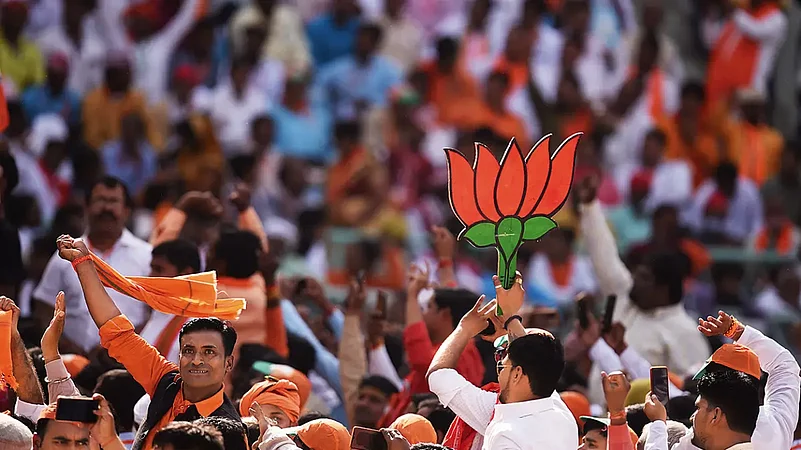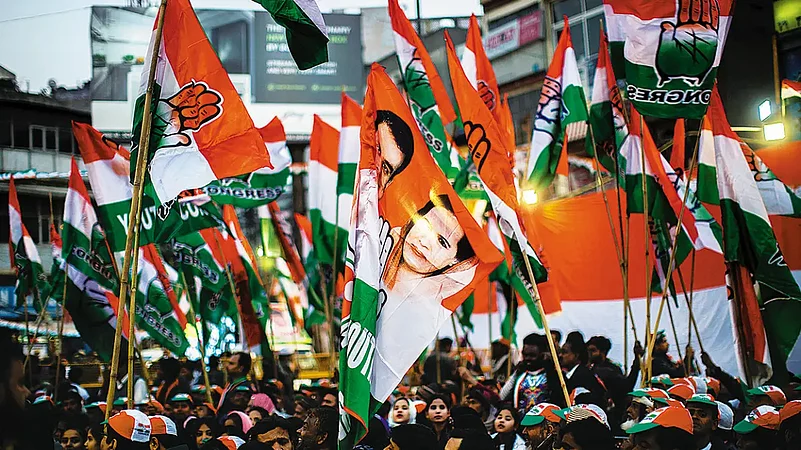I am writing this in the context of the totalit-a-r-ian propensities of the Bharatiya Janata Party (BJP), which are much more visible today than they ever were. However, we must remember that the political trajectory of India, since the first General Elections in 1952, includes the rise and fall of the fortunes of different political part-ies. Political analysts write obituaries of certain political outfits in haste, and are then forced to eat their words because these parties come back with new energy and stature. The political centre in India was carved from a charged nationalist mov-ement before people-based coalitions came to occupy an important part. There is great press-ure on parties to accommodate diverse interests and, as British jurist and liberal politician James Bryce had said, political parties have to organise the chaotic public will. But the real nucleus can be found in the unofficial structures of these parties. The confidence of the public, which transla-tes into electoral votes, is won by sustained pol--i-tical mobilisation. “Unofficial” party organisations play an important role in this, and in ensuring the primacy of grassroots democracy.
RJD: Time For Reappraisal Of Party Cadres
Political cadres not only act as an interface between parties and the masses, they also help in decentralising democracy at the grassroots

The primary functions of cadres include execu-ting party goals at the local level and reporting to higher-ups in the party hierarchy, garnering support for the local candidate, and organising community events and organisations. When the party is out of power, cadres undertake the responsibility of activism and of disseminating information about their party at the grassroots. In India, cadres mostly work on an unpaid basis, and volunta-r-ily devote time and energy to party work. An und-erlying quality of these workers is a close affi-n-ity to an ideology, and they associate the-mselves with one end of the political spectrum.

A compelling narrative needs a strong network to penetrate peo-ple’s imagination. On the ground, support is necessary to maintain relevance and popularity. This is precisely what BJP has done successfully, though it rema-ins a curious case. A majority of their cadre support comes from the RSS. A vast number of academics appear to concur that BJP’s reign has brought about more fundamental cha-n-ges in the way democracy runs and is understood.
BJP has benefited politically from the activity of RSS acti-vists in general, but it does not have control over them. True, the party has worked on developing its cadres since its inception, but until the early 2000s, its mohalla (street) network was not solid or ubiquitous enough over large swa-t-hes of India. As a result, for decades, it remained reliant on Sangh cadres for voter mobilisation during elections, which had its own set of problems. There is a growing gap between India’s electoral democracy and liberal democracy, and the difference can be felt most acutely at the grassroots. The BJP was able to project Modi as a leader with worthy credentials, deliver nuanced messages of nati-onalism to different target audiences and deflect the Opposition, owing to a political machine that was miles ahead of its competition in terms of org-a-nisational foundation and material resources. They have been successful in keeping the BJP relevant even after demonetisation, the migrant crisis, unemployment and high inflation. What is more concerning is that they have also been successful in bringing the fiction of religiosity, culture and mor-ality into politics with a fresh packaging.
ALSO READ: Unfailing Commitment Of CPI(M) Red Brigades

On the contrary, in recent times, the Indian National Congress has struggled with multiple issues and lost its popular support. We must not forget that Congress does not have an extreme political ideology and also lacks a strong cadre base. Party workers in Congress are mostly seen as being loyal to particular leaders rather than its ideology or the party itself. The party is essentially non-exi-s-tent in Bihar, Uttar Pradesh and Bengal, India’s most populous states. In southern states like Andhra Pradesh and Telangana too, it is virtually absent. The high command mentality, which had previously decided party matters at the national and state levels, has now been expanded to loc-al levels, with no connection to party workers on the gro-u-nd. The party currently lacks a strong leader and a fun-c-tional organisation, and its ideological objective of leftist-welfarist policies for the poor has been taken over by the BJP. To fight the BJP, Congress needs to recast its ideological agenda and open the party’s doors to newer faces. It must work on developing a progressive programme that catches the attention of the people and delivers the message that it is very different from the rhetorical positioning of the BJP. The party can also resurrect itself by rebuilding its organisation at the grassroots, repopulating its cadre with foot-soldiers and flag-bearers, and setting realistic goals for a political comeback in the future.
Left parties rely a lot on their cadre base too. For instance, the Communist Party of India (Marxist) and the Commu-n-ist Party of India (CPI) have their own pockets of influence among workers, peasants, college students and other members of the public, as well as a devoted cadre base, to carry out an election campaign. Communist parties have a hist-ory of fielding candidates from the grassroots, which is an uncommon sight in Indian politics. They are active in every party programme, during and after the elections, from goi-ng door-to-door seeking votes, to collecting campaign don-ations. Unlike other parties, where second-rung leaders pay for its candidates, in communist parties, certain cadres pay the security deposit of their local candidates.
The grassroots presence of cadres plays an important role in instilling democracy through collective leadership and individual responsibility. The Rashtriya Janata Dal (RJD), und-er the aegis of Tejashwi Yadav, has understood the importa-nce of capturing the imagination of the youth by engaging the masses and raising critical issues. RJD is building its party’s organisation by ramping up its social med-ia infrastructure and engaging the youth at a local level to raise area-specific issues. RJD is also trying to encourage its proactive cadres to promote a democratic, collective leadership style. RJD reco-gnises that political resources have to be mobili-s-ed for the marginalised sections, and ground pre-sence is necessary to translate these voices into political action.
One substantial factor that has not yet got wider critical scrutiny is the datafication and professio-n-alisation of election management. Several operators routinely approach parties and candidates with their data sets, analytical models and a host of other services, offering to ‘manage’ a range of political work that is usually carried out by cadres, such as constituency engagement, strategising, mobilising, elections campaigns, etc. This largescale takeover—or what I would call colonisation of politics by data entrepreneurs—has further led to the marginalisation of cadres and organic grassroots work. If elections can be run and won from ‘war rooms’ and cadres are required just to toe the line of a pre-decided strategy, then there is very little space left for cadres to develop their skills or even feel motivated to align themselves with parti-cular parties, policies and ideologies.? ?
ALSO READ: The Slow And Steady Decline Of BSP
Political cadres and mass engagement are important tools to teach and recruit new political leaders, such as women and young people who have never held a political position before. These lower levels of democracy also give citizens greater access to participate in public affairs. Residents can question local officials, watch what they do, express their concerns and interests and develop democratic citizenship skills and ideals. However, we must not limit the roles of cad-res to electoral gains. The informal network of cadres is an important connecting link for the sustenance of decentralised action and democracy. Otherwise, history is replete with instances when democracy breathed its last when the deepening of democracy was halted by ignoring the pivotal role played by the cadres.
(This appeared in the print edition as "Time for Reappraisal")
(Views expressed are personal)
ALSO READ
Manoj K. Jha Is a Rajya Sabha MP for RJD and a professor of Social Work at DU
- Previous Story
 Elections 2024: Ashok Tanwar Joins Congress Again; Sehwag Endorses Congress Candidate In Haryana
Elections 2024: Ashok Tanwar Joins Congress Again; Sehwag Endorses Congress Candidate In Haryana - Next Story
























